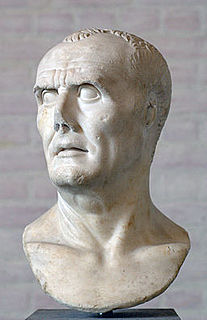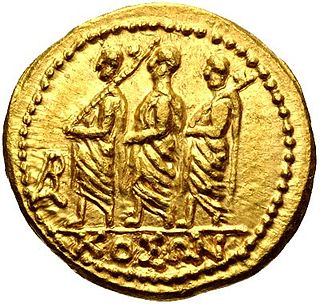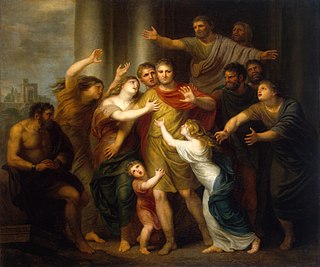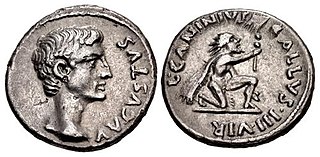Related Research Articles

A quaestor was a public official in Ancient Rome. The position served different functions depending on the period. In the Roman Kingdom, quaestores parricidii were appointed by the king to investigate and handle murders. In the Roman Republic, quaestors were elected officials who supervised the state treasury and conducted audits. It was the lowest ranking position in the cursus honorum. However, this means that in the political environment of Rome, it was quite common for many aspiring politicians to take the position of quaestor as an early rung on the political ladder. In the Roman Empire, the position, which was initially replaced by the praefectus (prefect), reemerged during the late empire as quaestor intra Palatium, a position appointed by the emperor to lead the imperial council and respond to petitioners.

Praetor, also prætor and pretor, was the title granted by the government of Ancient Rome to a man acting in one of two official capacities: (i) the commander of an army, and (ii) as an elected magistratus (magistrate), assigned to discharge various duties. The functions of the magistracy, the praetura (praetorship), are described by the adjective: the praetoria potestas, the praetorium imperium, and the praetorium ius, the legal precedents established by the praetores (praetors). Praetorium, as a substantive, denoted the location from which the praetor exercised his authority, either the headquarters of his castra, the courthouse (tribunal) of his judiciary, or the city hall of his provincial governorship.

Gaius Marius was a Roman general, politician, and statesman. Victor of the Cimbric and Jugurthine wars, he held the office of consul an unprecedented seven times during his career. He was also noted for his important reforms of Roman armies. He set the precedent for the shift from the militia levies of the middle Republic to the professional soldiery of the late Republic; he also improved the pilum, a javelin, and made large-scale changes to the logistical structure of the Roman army.
Marcus Valerius Corvus was an important military commander and politician from the early-to-middle period of the Roman Republic. In a distinguished career, he was elected Roman consul six times, his first at the unusual age of 23. He was also appointed Dictator two times, and led the armies of the Republic in the First Samnite War. He occupied the curule chair a total of twenty-one times throughout his career, and according to tradition he lived to be one hundred.

A lictor was a Roman civil servant who was an attendant and bodyguard to a magistrate who held imperium. Lictors are documented since the Roman Kingdom, and may have originated with the Etruscans.

A legatus was a high-ranking Roman military officer in the Roman Army, equivalent to a modern high-ranking general officer. Initially used to delegate power, the term became formalised under Augustus as the officer in command of a legion.
The magister equitum, in English Master of the Horse or Master of the Cavalry, was a Roman magistrate appointed as lieutenant to a dictator. His nominal function was to serve as commander of the Roman cavalry in time of war, but just as a dictator could be nominated to respond to other crises, so the magister equitum could operate independently of the cavalry; like the dictator, the appointment of a magister equitum served both military and political purposes.
Gaius Marius "the Younger" was a Roman republican general and politician who became consul in 82 BC with Gnaeus Papirius Carbo. He fought in Sulla's second civil war. He committed suicide that same year at Praeneste, after his defeat by Lucius Cornelius Sulla and during the city's capture by Quintus Lucretius Afella.

A consul held the highest elected political office of the Roman Republic, and ancient Romans considered the consulship the second-highest level of the cursus honorum after that of the censor. Each year, the Centuriate Assembly elected two consuls to serve jointly for a one-year term. The consuls alternated in holding fasces each month when both were in Rome and a consul's imperium extended over Rome and all its provinces.

Lucius Minucius Esquilinus Augurinus was a Roman politician in the 5th century BC, consul in 458 BC, and decemvir in 450 BC.

Marcus Atilius Regulus was a Roman statesman and general who was a consul of the Roman Republic in 267 BC and 256 BC.
Gaius Atilius Regulus Serranus was a Roman Republican consul who twice held the consulship in the middle of the 3rd century BC. His elder brother, father, and grandfather were all consuls.
Lucius Manlius Torquatus was a Consul of the Roman Republic in 65 BC, elected after the condemnation of Publius Cornelius Sulla and Publius Autronius Paetus.
The gens Anicia was a plebeian family at ancient Rome, mentioned first towards the end of the fourth century BC. The first of the Anicii to achieve prominence under the Republic was Lucius Anicius Gallus, who conducted the war against the Illyrii during the Third Macedonian War, in 168 BC.

The gens Caninia was a plebeian family at ancient Rome during the later Republic. The first member of the gens who obtained any of the curule offices was Gaius Caninius Rebilus, praetor in 171 BC; but the first Caninius who was consul was his namesake, Gaius Caninius Rebilus, in 45 BC.
Quintus Poetelius Libo Visolus was a Roman politician, and member of the Second Decemvirate in 450 and 449 BC.
Caeso Duillius was a Roman politician, and member of the Second Decemvirate in 450 and 449 BC.
The gens Rabuleia was a minor plebeian family at ancient Rome. Members of this gens are first mentioned in the early decades of the Republic, and Manius Rabuleius was a member of the second decemvirate in 450 BC. However, the Rabuleii subsequently fell into obscurity, and only a few of this family are known from later inscriptions.
References
 This article incorporates text from a publication now in the public domain : Smith, William, ed. (1870). "Rabuleius". Dictionary of Greek and Roman Biography and Mythology .
This article incorporates text from a publication now in the public domain : Smith, William, ed. (1870). "Rabuleius". Dictionary of Greek and Roman Biography and Mythology .